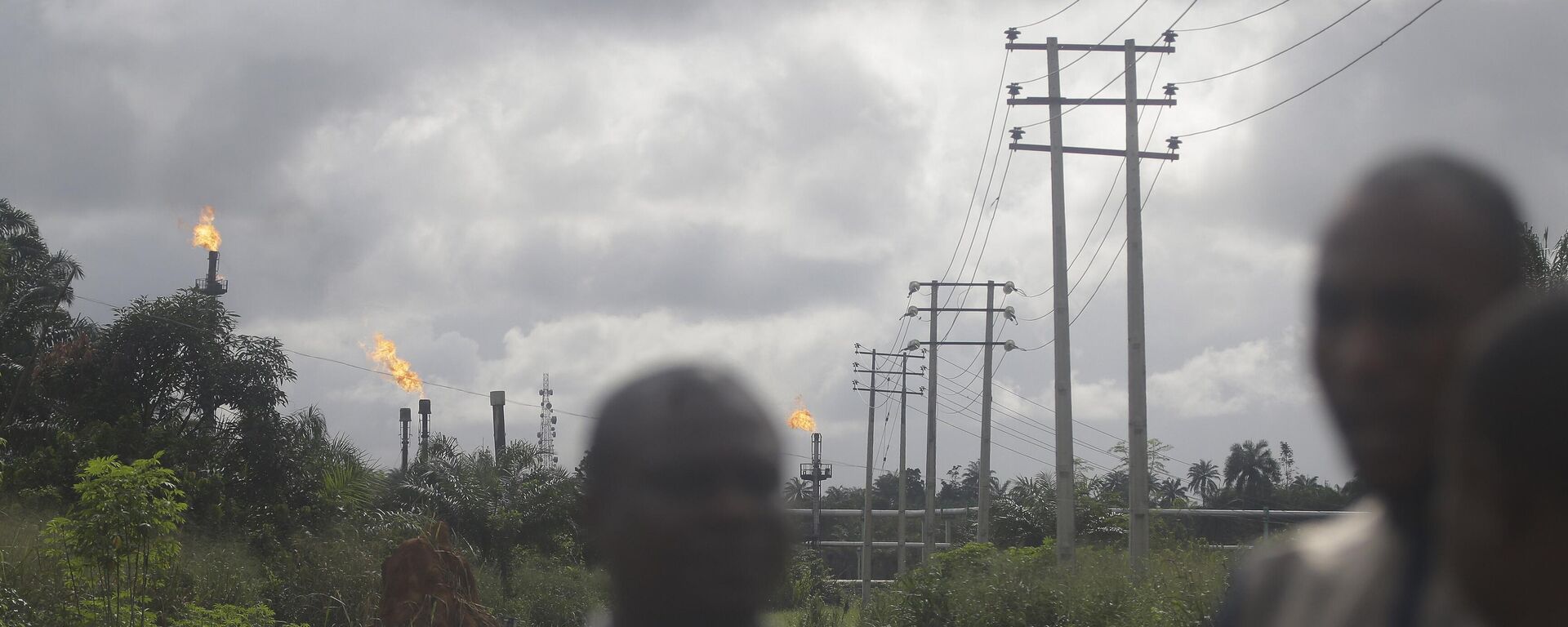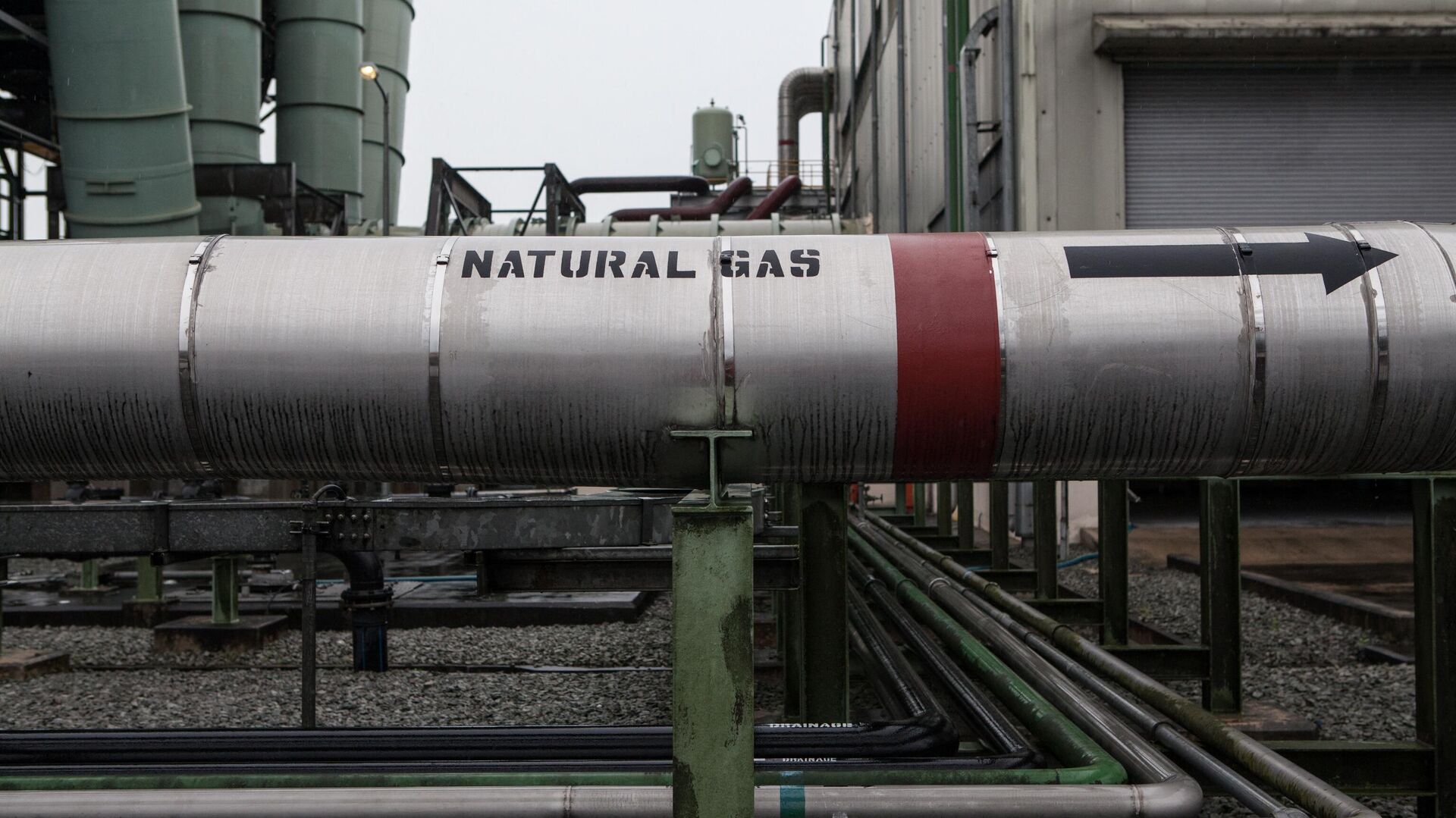https://sputnikglobe.com/20230408/nigeria-and-morocco-to-invest-125-billion-each-in-gas-pipeline-1109276686.html
Nigeria and Morocco to Invest $12.5 Billion Each in Gas Pipeline
Nigeria and Morocco to Invest $12.5 Billion Each in Gas Pipeline
Sputnik International
To obtain a 50% stake in the Nigeria-Morocco gas pipeline, the The Nigerian National Petroleum Company will finance half of the project, namely $12.5 billion
2023-04-08T16:21+0000
2023-04-08T16:21+0000
2023-04-08T16:21+0000
africa
north africa
west africa
morocco
nigeria
pipeline
gas pipeline
economic community of west african states (ecowas)
https://cdn1.img.sputnikglobe.com/img/07e7/04/08/1109277125_0:161:3071:1888_1920x0_80_0_0_ff9639b80844b2964d402aad3f522bdb.jpg
The Nigerian National Petroleum Company (NNPCL) and Morocco's National Office of Hydrocarbons and Mines (ONHYM) are due to jointly finance the $25 billion Nigeria-Morocco gas pipeline in equal shares, authorities have announced.Mallam Mele Kyari, NNPCL managing director, stated that the project is already in Phase II of the preliminary research and is currently undergoing an environmental impact assessment – as well as rights-of-way investigations.According to him, NNPCL is making use of Nigeria's vast natural gas reserves, which comprise more than 5,6 billion cubic meters. It could grow to around 17 billion cubic meters, he stressed, as an increase in investment is expected after a number of production-sharing contract disputes with partners are resolved.He claimed that the huge reserve will provide a boost to energy and industrial sectors. Kyari also underlined that it will provide a low-carbon energy alternative and help reduce the carbon footprint, fighting unemployment and poverty.The managing director also stated that his country's gas infrastructure network is capable of transporting about 195 million cubic meters of gas to enable power generation.Project at an Advanced StageThe gas pipeline is one of the projects linking Nigeria and Morocco through several West African countries. Several memoranda of understanding have been signed in recent months – the first between the Economic Community of West African States (ECOWAS), Nigeria and Morocco, and two others between Morocco, Nigeria and Mauritania on the one hand, and Morocco, Nigeria and Senegal on the other. Five more trilateral memoranda of understanding have been signed by Morocco and Nigeria, on the one side, and Gambia, Guinea Bissau, Guinea, Sierra Leone and Ghana, on the other.In accordance with the project, the pipeline will run along the West African coast from Nigeria, through Benin, Togo, Ghana, Côte d'Ivoire, Liberia, Sierra Leone, Guinea, Guinea-Bissau, Gambia, Senegal and Mauritania to Morocco. It will also supply nearby Niger, Burkina Faso and Mali and will be connected to the Maghreb-Europe gas pipeline and the European gas network.The project is expected to cover approximately 5,600 km through 11 African countries and set a record as the longest offshore gas pipeline in the world.
https://sputnikglobe.com/20230114/nigerian-firm-discovers-oil-in-northern-state-of-nasarawa-media-report-1106307701.html
africa
north africa
west africa
morocco
nigeria
Sputnik International
feedback@sputniknews.com
+74956456601
MIA „Rossiya Segodnya“
2023
Sputnik International
feedback@sputniknews.com
+74956456601
MIA „Rossiya Segodnya“
News
en_EN
Sputnik International
feedback@sputniknews.com
+74956456601
MIA „Rossiya Segodnya“
Sputnik International
feedback@sputniknews.com
+74956456601
MIA „Rossiya Segodnya“
west africa, north africa, nigeria-morocco gas pipeline, intra-african cooperation, the nigerian national petroleum company (nnpcl), equal shares, low-carbon energy, job opportunities, economic community of west african states (ecowas)
west africa, north africa, nigeria-morocco gas pipeline, intra-african cooperation, the nigerian national petroleum company (nnpcl), equal shares, low-carbon energy, job opportunities, economic community of west african states (ecowas)
Nigeria and Morocco to Invest $12.5 Billion Each in Gas Pipeline
The Nigeria-Morocco gas pipeline is among the flagship projects linking the two countries through 11 West African states. Covering approximately 5,600 km, it is expected to set a record as the longest offshore gas pipeline in the world.
The Nigerian National Petroleum Company (NNPCL) and Morocco's National Office of Hydrocarbons and Mines (ONHYM)
are due to jointly finance the $25 billion Nigeria-Morocco gas pipeline in equal shares, authorities have announced.
Mallam Mele Kyari, NNPCL managing director, stated that the project is already in Phase II of the preliminary research and is currently undergoing an environmental impact assessment – as well as rights-of-way investigations.
According to him, NNPCL is making use of Nigeria's vast natural gas reserves, which comprise more than 5,6 billion cubic meters. It could grow to around 17 billion cubic meters, he stressed, as an increase in investment is expected after a number of production-sharing contract disputes with partners are resolved.
He claimed that the huge reserve will provide a boost to energy and industrial sectors. Kyari also underlined that it will provide a low-carbon energy alternative and help reduce the carbon footprint, fighting unemployment and poverty.
The managing director also stated that his country's gas infrastructure network is capable of transporting about 195 million cubic meters of gas to enable power generation.

14 January 2023, 08:03 GMT
Project at an Advanced Stage
The gas pipeline is one of the projects linking Nigeria and Morocco through several West African countries.
Several memoranda of understanding have been signed in recent months – the first between the Economic Community of West African States (ECOWAS), Nigeria and Morocco, and two others between Morocco, Nigeria and Mauritania on the one hand, and Morocco, Nigeria and Senegal on the other. Five more trilateral memoranda of understanding have been signed by Morocco and Nigeria, on the one side, and Gambia, Guinea Bissau, Guinea, Sierra Leone and Ghana, on the other.
In accordance with the project, the pipeline will run along the West African coast from Nigeria, through Benin, Togo, Ghana, Côte d'Ivoire, Liberia, Sierra Leone, Guinea, Guinea-Bissau, Gambia, Senegal and Mauritania to Morocco.
It will also supply nearby Niger, Burkina Faso and Mali and will be connected to the Maghreb-Europe gas pipeline and the European gas network.
The project is expected to cover approximately 5,600 km
through 11 African countries and set a record as the longest offshore gas pipeline in the world.



